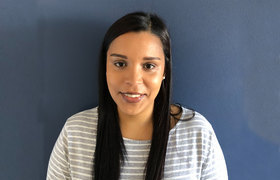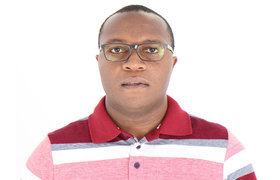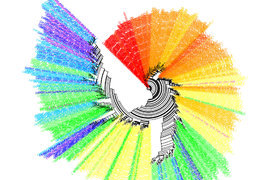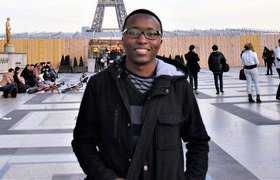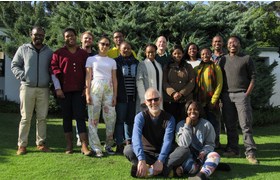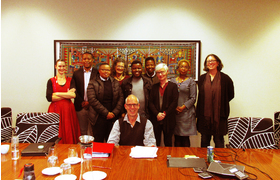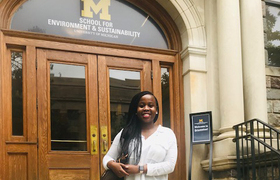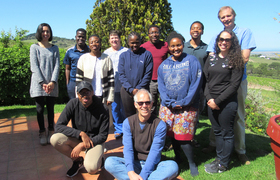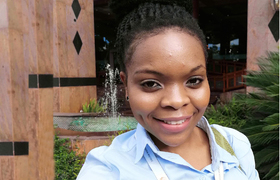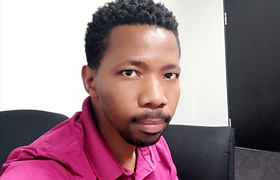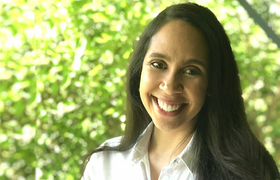Award, public profile and international conferences – nGAP makes its mark
22 October 2019 | Story Robert Morrell. Photos Provided. Read time 3 min.
Philile Mbatha – Invited to the University of Michigan
Philile was recently awarded a prestigious scholarship to visit the University of Michigan for a semester. She reports that after her first two months on the UMAPS programme “all her expectations have been exceeded”.

The University of Michigan African Presidential Scholars Program (UMAPS) brings early career faculty from African universities to Ann Arbor, Michigan. Scholars are paired with a faculty collaborator during their stay. The program supports the development of the next generation of African scholars by integrating them into international academic networks while promoting research and teaching collaborations across diverse disciplines.
Philile has, with 13 other UMAPS scholars, been in Ann Arbor since August. She writes that “we were initially welcomed by the programme directors in a two-week long orientation. We were introduced to different people and activities within the university and the wider Ann Arbor and Detroit areas. I have been paired up with a mentor, Dr Bilal Butt, who is a professor in the School for Environment and Sustainability. We meet weekly and develop my research ideas, as well as preparing for a postgraduate module that I am planning to teach at UCT when I return”.

The book started off as a translingual book written in isiXhosa-English-Afrikaans and is now available in Setswana-English and isiZulu-English. The book got the attention of an official from the Department of Basic Education, who appreciated its contribution for debating bilingual education.
Xolisa read and launched the isiZulu-English and Setswana-English versions of Halala Winner at the South African Book Fair at Constitution Hill, Johannesburg, in September.
Amanda Mtya – construction computing in Italy

Amanda attended the Summer School on ‘Computing in Construction’ held in Senigallia in July. Senigallia is a port town on the east coast of Italy, due east from Florence and close to the provincial capital city Ancona. Amanda describes the learning experience as ‘intense’ – a normal day lasted twelve hours, from 09:00 to 21:00!
“The course went beyond my expectations and the great part was that from all the consultations and access to international projects and information I narrowed my PhD topic/focus.”
Kentse Mpolokeng – conferences at home and abroad

Kentse attended the 47th annual conference of the Anatomical Society of Southern Africa, hosted by the University of Pretoria and held at Pilanesberg. For her oral presentation she was awarded the first runner up position for the Hanno-Boon Award in the Medical Education session. She also joined colleagues and attended the conference of the International Federation of Associations of Anatomists (IFAA 2019), held in London in August.
In London she presented three posters: “An intra-orbital study of the human orbit showing a single ethmoidal foramen for the transport of the neurovascular structures – a rare case”, “Access to human cadaver material by an international researcher from an institution that does not use cadavers in their medical training” and “The use of human tissue as a way to enhance classroom learning: an inter-university collaboration”.
Taahira Goolam Hoosen – Empowering writers at the Faculty of Health Sciences
The annual National Writing Centre Colloquium was held at the University of Pretoria in September. The theme was ‘Consultant Training’ and was an opportunity for South African writing centres to share their practices on meeting the challenges to support student academic literacy development. Taahira and a senior consultant represented the University of Cape Town’s Faculty of Health Sciences Writing Lab.
They emphasised the importance of consultants sharing their valuable knowledge of theory to develop a conceptual framework and support authorial identity development. This is part of the Lab’s current research study to theorise writing consultants’ practices and reflect on their transformative ideology to empower writers, rather than the dominant discourse of ‘fix the writing’.
 This work is licensed under a Creative Commons Attribution-NoDerivatives 4.0 International License.
This work is licensed under a Creative Commons Attribution-NoDerivatives 4.0 International License.
Please view the republishing articles page for more information.
New Generation of Academics Programme (nGAP)
UCT has responded energetically to the New Generation of Academics Programme (nGAP), an opportunity provided by the Department of Higher Education (DHET) to build a new generation of black South African academics. The DHET’s 2015 vision document, “Staffing South Africa’s Universities Framework: A comprehensive, transformative approach to developing future generations of academics and building staff capacity”, proposes a suite of initiatives to address the challenge, with nGAP being the major instrument to increase the numbers of black South African academics.
The programme “involves the recruitment of highly capable scholars as new academics, against carefully designed and balanced equity considerations and in light of the disciplinary areas of greatest need”. The nGAP scholars are appointed into permanent positions where from the outset their conditions are customised to ensure their successful induction into the ranks of established academics.
The DHET provides funding over a six-year period to support the appointment of an nGAP lecturer, and their time is protected to provide the best possible opportunity for the completion of a doctorate degree in the shortest possible time. Once the degree is completed, the nGAP lecturer’s teaching commitments are steadily increased until they shoulder a full teaching load.
Since the first advertisement for nGAP posts in 2015, UCT has been awarded 17 nGAP positions: 5 (Phase 1), 4 (Phase 2), 3 (Phase 3) and 5 (Phase 4). These are distributed across all faculties.
UCT’s nGAP scholars operate as a single cohort, managed and coordinated by Dr Robert Morrell. Lecturers meet for quarterly meetings, writing retreats and various capacity-building activities all designed to support the completion of postgraduate qualifications (particularly doctorates) and to develop records of achievement that will testify to their emergence as self-standing, excellent academics. Each lecturer is mentored by a senior scholar, who provides support and guidance on the challenges that routinely face academics.
The nGAP manager sets great store in building the cohesion of the cohort and encouraging the establishment of new UCT networks while producing a collaborative, mutually supportive and embracing work culture.
According to Dr Morrell, “This group of academics will lead UCT in 15 to 20 years’ time ... Their vision of excellence, of being African and South African, of serving a wider community and producing knowledge for the planet, the continent and the country, will power UCT in years to come.”
Newsletters
In the news
